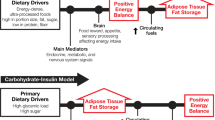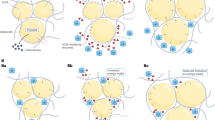Abstract
Obesity is a multifactorial and complex affectation that is characterized by a long-term excess energy intake (EI) above energy expenditure (EE). Since fat oxidation seems to be dependent on SNS activation and also seems to remain acutely unaffected by fat intake, this macronutrient is certainly partly responsible for this situation. In addition, high-fat intake does not induce as potent satiety signals or a compensation effect on subsequent EI as do diets rich in carbohydrates or proteins. Moreover, since alcohol intake acutely inhibits fat oxidation and does not promote subsequent compensation for its energy content, it should consequently be regarded as a substrate which can induce a positive energy balance under free-living conditions. Thus, in a weight reducing context, each energy substrate should be manipulated while taking into account its specific characteristics. Obesity has also often been associated to a decreased sympathetic nervous system (SNS) activity, hence sympathomimetic agents have been proposed as a possible way to partially correct this situation. Two of these agents are the widely consumed caffeine (CAF) and the pungent principle of hot red pepper, capsaicin (CAP), which acutely increase EE and reduce EI under some circumstances. Furthermore, other factors like dietary fibers, that have been shown to increase satiety and fullness, and reduce EI in some cases, should also be considered.
This is a preview of subscription content, access via your institution
Access options
Subscribe to this journal
Receive 12 print issues and online access
$259.00 per year
only $21.58 per issue
Buy this article
- Purchase on Springer Link
- Instant access to full article PDF
Prices may be subject to local taxes which are calculated during checkout
Similar content being viewed by others
Author information
Authors and Affiliations
Rights and permissions
About this article
Cite this article
Doucet, E., Tremblay, A. Food intake, energy balance and body weight control. Eur J Clin Nutr 51, 846–855 (1997). https://doi.org/10.1038/sj.ejcn.1600497
Received:
Revised:
Accepted:
Issue Date:
DOI: https://doi.org/10.1038/sj.ejcn.1600497
Keywords
This article is cited by
-
Einfluss der Ernährung und des Essverhaltens auf die Entwicklung der Adipositas bei Kindern und Jugendlichen
Bundesgesundheitsblatt - Gesundheitsforschung - Gesundheitsschutz (2010)
-
Effects of persimmon-vinegar on lipid and carnitine profiles in mice
Food Science and Biotechnology (2010)
-
Early anthropometric measures and reproductive factors as predictors of body mass index and obesity among older women
International Journal of Obesity (2005)
-
The influence of the type of dietary fat on postprandial fat oxidation rates: monounsaturated (olive oil) vs saturated fat (cream)
International Journal of Obesity (2002)
-
Clinical implications of leptin and its potential humoral regulators in long-term low-calorie diet therapy for obese humans
European Journal of Clinical Nutrition (2002)



